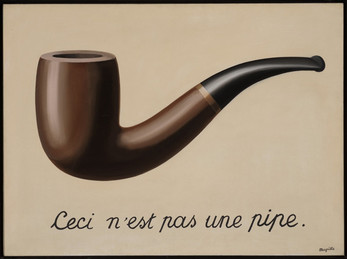not a pipe
A downloadable game
Maybe you've seen this game before. At any rate, you're seeing it right now.
The game is simple:
1. Find a picture of something.
2. Describe it.
3. No really, describe the picture.
4. Try harder. Describe what you are seeing.
5. You're not quite getting it. Describe what your eyes are showing you.
6. Okay, let's break it down. Explain what this specific batch of light, colliding with your retinas, is doing in relation to your brain.
7. That's not really the point, here. Construct a narrative that explains how a particular collection of photons, which you deem cohesive in their abstractly thematic tethering, is influencing the anatomy within the fleshy orbs of your head you call eyeballs, and how those influence the pulsing strands you call nerves.
8. You still don't truly understand, do you? Use words to label the behavior of energy being reflected by a certain subset of atoms you label as separate from yourself, as it's interacting with a certain subset of atoms you label as part of yourself, such that the latter atoms change in such a way that they maintain such a label despite their necessary transformation, to the extent that they must both paradoxically be a different subset of atoms in order to have been meaningfully impacted by the energy, as well as the same subset of atoms in order to continue falling under the label you first gave them.
9. Find a picture of You.
| Status | Released |
| Category | Physical game |
| Rating | Rated 5.0 out of 5 stars (1 total ratings) |
| Author | meanderxander |

Comments
Log in with itch.io to leave a comment.
Hello Xander, how can I reach you by email?
describing my soul, undergoes entanglement, breathing the storm of anaphora through the lungs of deixis, finding you there - your growing just fine, the ecology of your attention under this care a dawn burning through every dewdrop of presence to sit with you, or passing you a cup of tea
Love you!
mountains walk their coil, theia rises, finding every wave geology will ever write, the language of coral and lightning, holding to each stratum its own light, the moons craters living pools, recognizing that their own capacity for holding light might be smaller than the collective luminescence of all who have held them each small act of noticing building something larger than itself, something that creates new rivers for shared attention’s florishing, each breath held hearing this - bioluminescence
This is “not a pipe”, a game-poem that plays with reformulation.
Starting from the obviousness for humans of the content of their perception,a “tutorial voice” leads us via instructions into a radical regression questionning perception altogether.
The the voice repeatedly stating it’s not being understood by “you” (the reader) points at another problematic human interface with reality: language.
After a few steps, it’s clear the reformulation - regression could be infinite. The poem neatly ends on a (somewhat sketchy) Borgessian note, where the viewer has switched position and is now viewed.